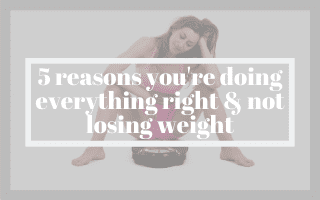Raise your hand if you’ve ever said (or thought), “I’m doing everything right and it’s not working – I’m not losing weight!”
You’re not alone.
It’s frustrating to be exercising more or eating better & not losing weight. Why bother, right? Why not just go back to what you’d been doing if it doesn’t make any difference? Not so fast.
This article will help you troubleshoot what could be going wrong here and what to tweak!
The Big 2 Factors
There are 2 separate issues here:
1) Are you actually not losing weight?
2) Are you actually doing everything right?
Are you actually not losing weight?
The problem: You aren’t looking for your results in the right places.
If you’re only using the scale to gauge progress, you’re only seeing a tiny piece of the puzzle.
Taking this narrow scope can cause you to think you’re not losing weight when you’re actually just overlooking the results. It’s entirely possible that your fat loss is being masked by one of any number of factors that impact the scale (here are 13 for you.)
The solution: Track multiple indicators of progress.
If you’re not already, start taking circumference measurements (waist and hip, at minimum) and full-body (front, side, back) photos to help you get an idea of the bigger picture of what changes are happening with your body composition.
Other indicators of progress include energy levels & mood throughout the day, being able to run or ride faster/longer, lift heavier weights, and clothes fitting differently.
If you’re seeing improvements in any/all of the above, it’s working!
Don’t freak out and do anything drastic, just stay the course. (And maybe make sure your weight loss expectations are realistic.)
Are you actually doing everything right?
If you’re looking at the scale, measurements, photos, performance, mood, energy, and not seeing any changes to any of them or you feel like the changes are disproportionate to the effort you’re putting in, it’s time to figure out what you’re overlooking:
The problem: You’re exercising for weight loss.
You’ve started going to Orange Theory a five times per week.
You bought a Peloton that you ride everyday.
You pay close attention to how many calories you burn when you workout. Maybe doing double workouts if you feel like you haven’t burned enough.
Makes sense; when you’re trying to lose weight, burning more calories is good – right?!
Unfortunately, it’s not that simple.
There are 3 main reasons that exercising for weight loss can backfire:
1) You’re not as active as you think you are.
An hour of intense exercise most days of the week doesn’t make us truly active people. A lot of us have sedentary jobs and lifestyles outside of the gym so even though we’re really putting out during our workouts, we’re not that active over the course of the entire day.
This can be compounded by:
2) You inadvertently move less throughout the day when you workout.
You might really put out during your 20-60 minute workout but outside of that, you may be less active than you were before!
It could be as blatant as justifying an extra hour of Netflix when you used to take the dog to the park.
But it can also be as subtle as parking closer, taking the elevator, or playing with your kids less enthusiastically.
The end result? Despite your workouts, you’re actually burning the same number or fewer calories than you were before.
This can be compounded by:
3) You inadvertently eat more when you workout.
This can be as blatant as saying, “I worked out today, I deserve this [really high calorie food that will more than negate the calorie burn of the workout].”
But it can also be as subtle as an extra snack, few bites off your kid’s plate, and a trip or two to the candy jar at work.
The end result? You’re eating as much as or more than you were before.
The solution: Even though exercise is great (especially strength training) for literally dozens of reasons and you want to be in the habit of doing it consistently for your overall health, happiness, and weight maintenance, it doesn’t make a great weight loss tool.
Instead of doing it to burn as many calories as possible, factor your average weekly activity level into your calorie target and then focus on exercising to get stronger, fitter, and help improve your health and body composition.
Which brings us to the next potential place where you think you’re doing everything right but might not be:
The problem: You’re not quantifying your diet.
You eat “pretty well” but aren’t really paying attention to how much you’re eating.
Unfortunately, it’s entirely possible to overeat “clean” foods (especially fat sources)! Eating “healthy” doesn’t make losing weight inevitable.
The solution: Track every single thing you eat and drink for one week. You’ll likely notice some obvious areas you can make improvements. Once you have a baseline, you can start working toward a caloric deficit (and protein target) to help you lose fat.
The problem: You’re tracking calories/macros and think you’re eating a certain amount but you’re not tracking accurately.
The fact that you’re tracking for awareness is great!
But unfortunately, just the act of tracking doesn’t make losing weight inevitable. There are a number of ways that you may be eating more than you think, tracking inaccurately and, therefore, not realizing it:
- Using measuring cups/spoons – though convenient, cup/spoon measurements can be pretty ambiguous and lead to tracking errors of up to a hundred calories or so!
- Logging retroactively – if you don’t do it in advance or in-the-moment, it’s very hard to accurately recall what & how much you’ve eaten. Do you even remember what you had for lunch yesterday? Let alone if you polished off a couple of your kid’s chicken nuggets?
- Forgetting to track small things – Bites, sips, licks, tastes, sauces, condiments, sweeteners, cream, and liquid calories all count.
- Guessing on a lot of restaurant meals – going out to eat is an inevitable (and enjoyable!) part of life. Part of the reason food at restaurants tastes so good is because they cook with more oil/butter/salt than you would at home. Meals out are likely a lot more calorie dense than you realize.
- Choosing inaccurate entries – unfortunately a lot of entries in food tracking apps are fake news. It takes a discerning eye to know what to look for in an entry.
While each of these oversights may be relatively minor, they can add up to make your food log wildly inaccurate!
The solution:
- Weigh to the gram/ounce
- Log as much in advance as you’re able so that then all you have to do is follow the plan. When that’s not an option, log as you go.
- If it goes in your mouth, no matter how insignificant, it should be documented. Developing awareness around mindless eating can be really eye opening.
- Cook as many of your own meals as possible. The more often you eat out, the less accurate your log is going to be.
- Make sure entries have macros listed, not just calories, and pull up a few to make sure the one you’re choosing is within the realm of possibility. Cross referencing Google is never a bad idea and working with an experienced coach can help you hone your skills.
The problem: You’re doing a combination of too much intense exercise, too little food, and not enough focus on fueling, recovery, and stress management.
Even though it’s usually a combination of just eating more and moving less than we realize, sometimes it’s a matter of simultaneously doing too much and too little.
If you’re feeling run down, getting sick often, aren’t able to put out in your workouts, and aren’t seeing any progress, it might be time to take your foot off the gas and assess what you’re doing to your body.
The solution: Experiment with a slight increase in food and/or decrease in intense exercise, and focus on stress management techniques.
Eating a little more is often compensated by an even larger increase in movement because now you actually have the energy to expend during your workouts and throughout the day!
Working out a little less allows your body proper time to recover and come back stronger – allowing you to see the benefits that you’re working so hard for!
Engaging in restorative practices like yoga, meditation, walking, and spending time in nature helps your body combat chronic stress that may be making weight loss harder than it needs to be!
Where do you go from here?
My hope is that one or two of the factors above will help you resonate with you and help you focus your attention on whatever changes will be the most impactful for you.
Please know that you’re not an anomaly, doomed to be fat and miserable forever, and that you can take some action toward figuring out your next move.
If you’d like help with that, I’d love for you to schedule a free consult call with me! We’ll chat about your goals, challenges, and if it makes sense, we’ll talk about working together




